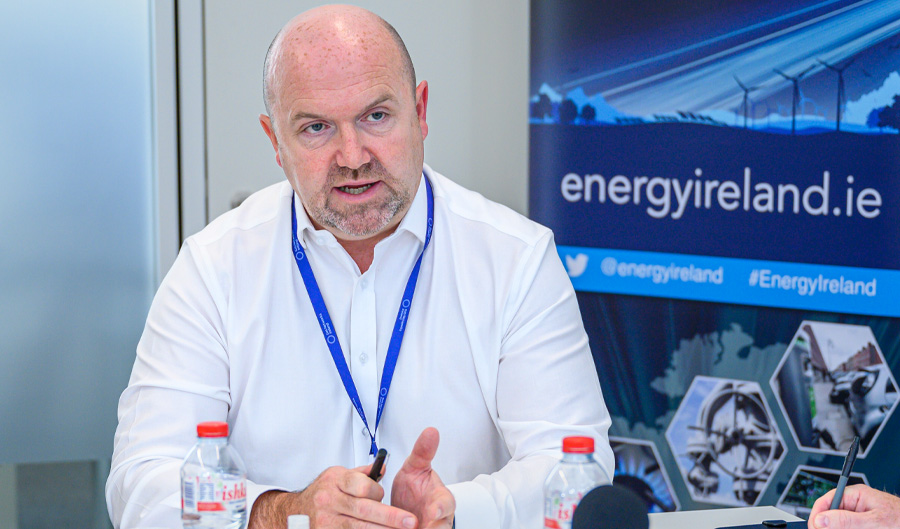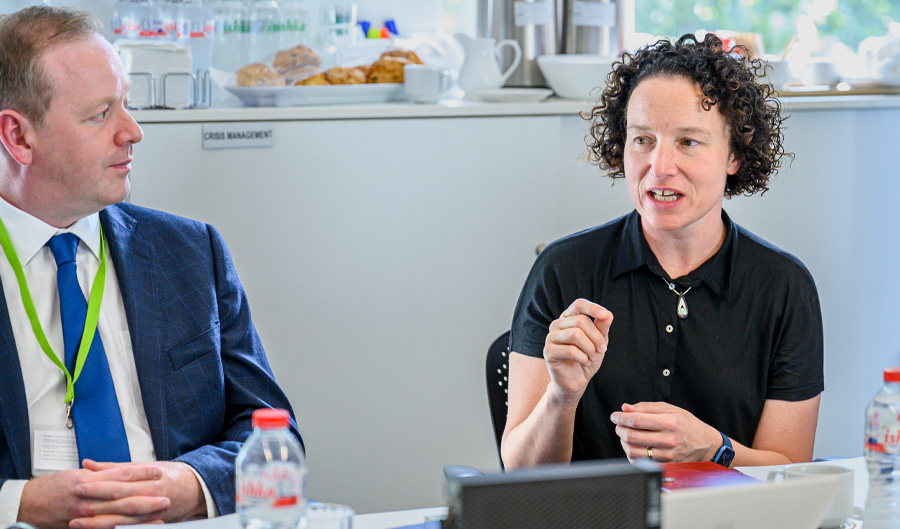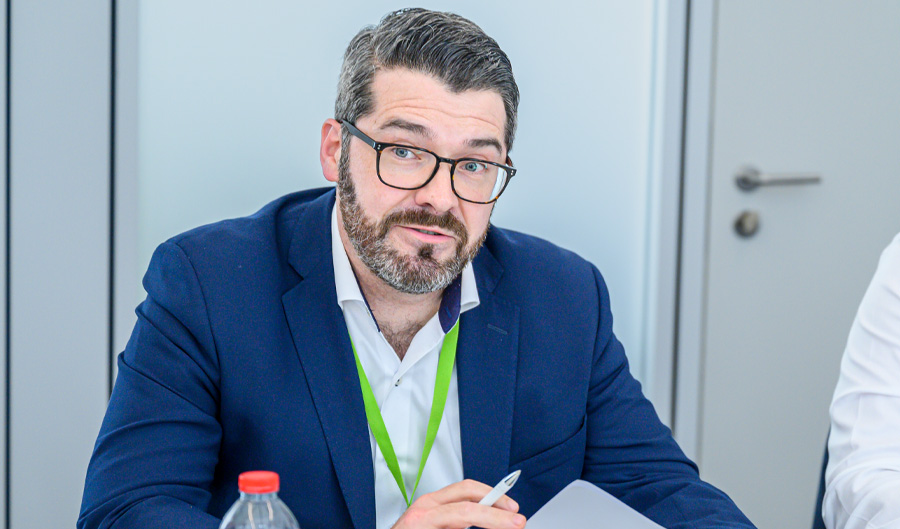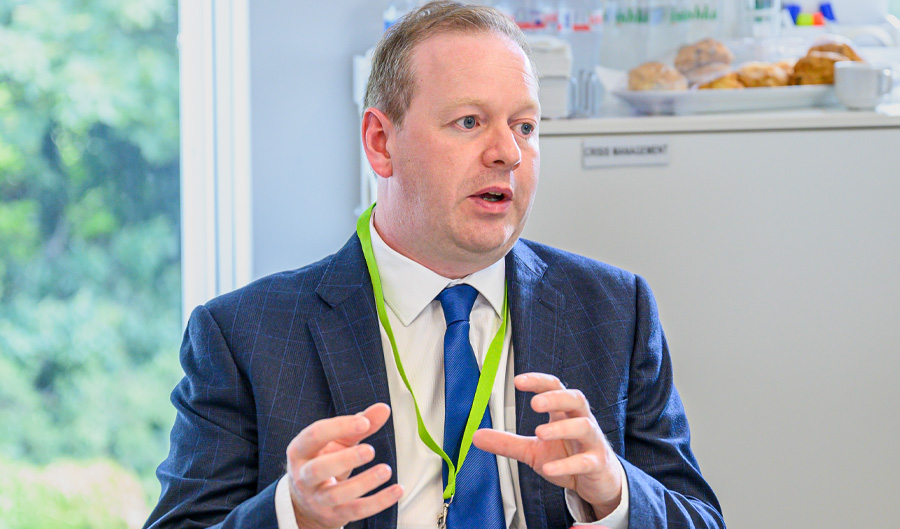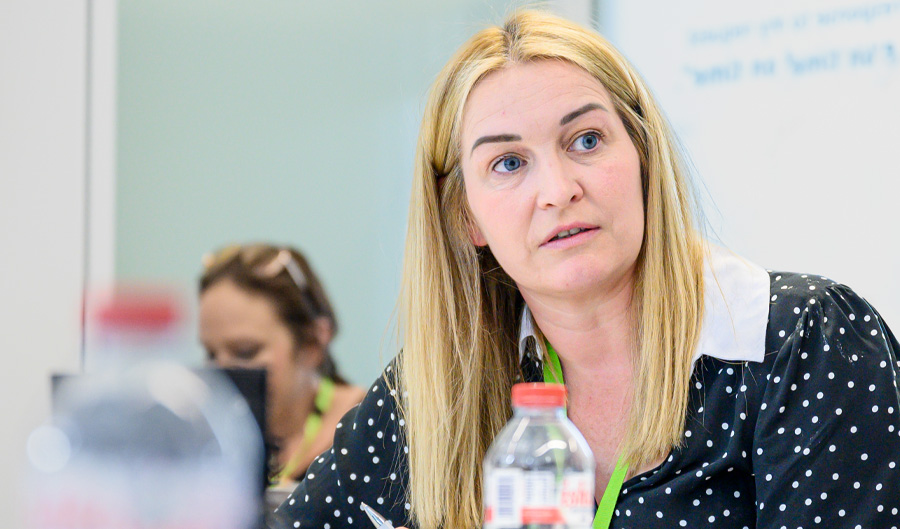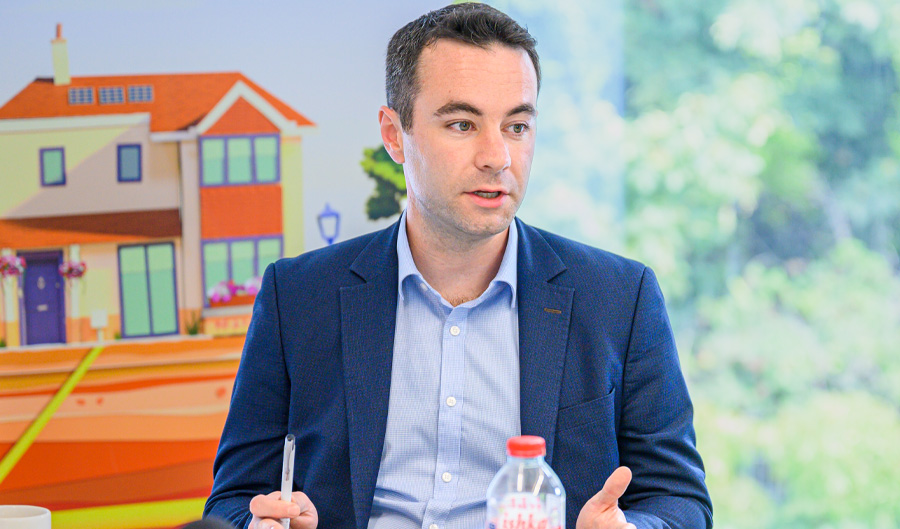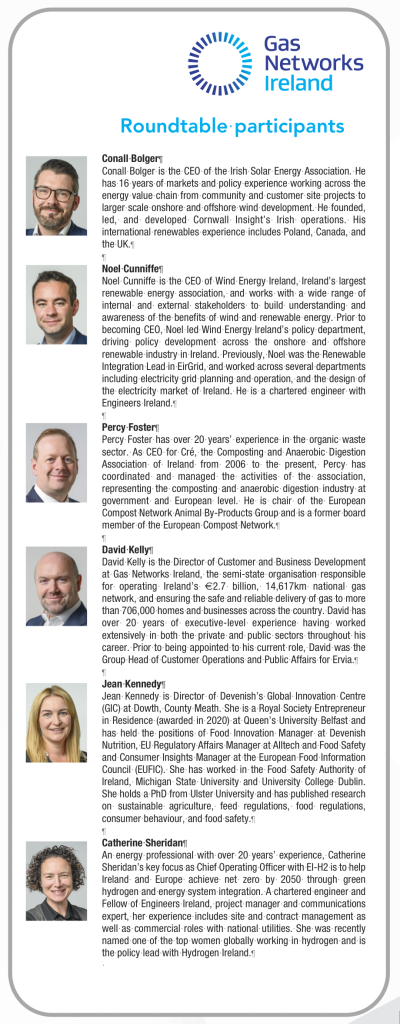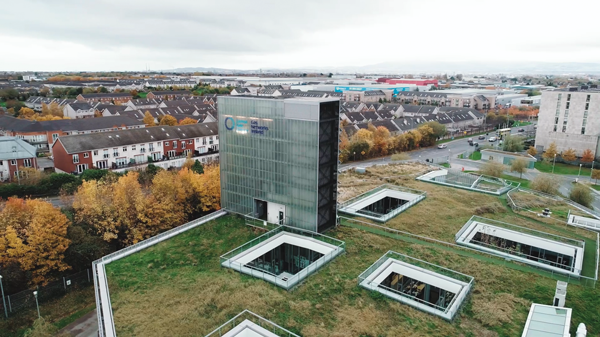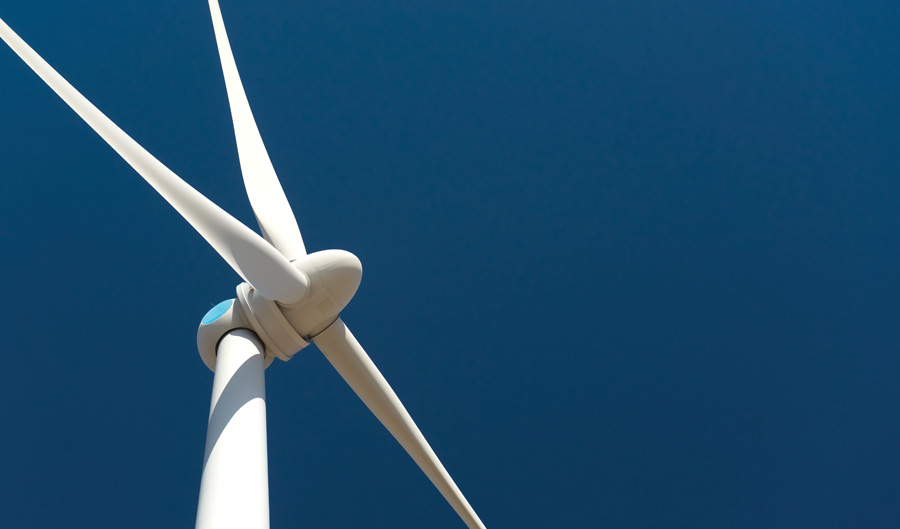
Consumer driven integration of renewables
12th October 2022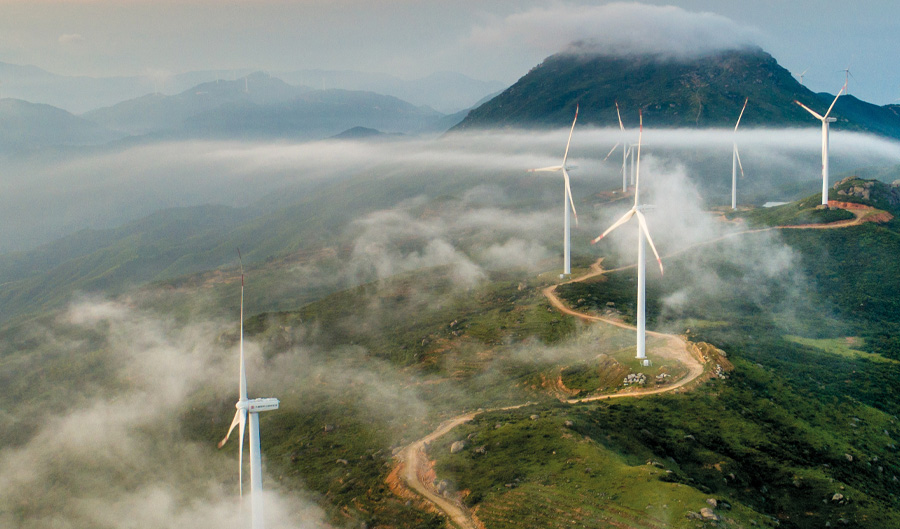
Hitachi Energy: The future is electric
12th October 2022Ireland’s sustainable and integrated energy system
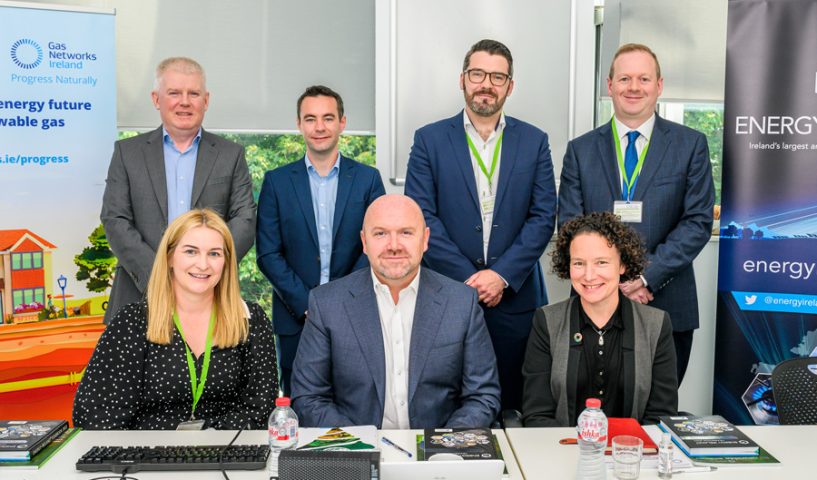
Gas Networks Ireland hosted a round table discussion on making Ireland’s energy system more sustainable and integrated at its low carbon service centre on St Margaret’s Road, Finglas, Dublin.
What role is your organisation playing in meeting Ireland’s climate action targets?
Jean Kennedy
Devenish has been investing in research and innovation action at our research farm at the Devenish Lands at Dowth since 2013, focusing on sustainable farming and food. Farming is one of the very few industries that has the ability to sequester carbon as well as emit it. We have been working towards understanding how to measure and manage net on-farm carbon and we can now say that we have achieved carbon neutrality. We are also looking at the art of the possible in data-driven sustainable agriculture solutions.
Conall Bolger
We are the representative body for the solar energy industry in Ireland, with 190 members. We are very focused on decarbonisation, taking a whole-system view. We have three main areas of activity. The first is engagement on policy and regulation to support a higher volume of solar energy. The second is education as there is still some scepticism about solar energy in Ireland. There is useable electricity falling on our roofs and fields every day. The third is encouraging good practice. In the industry we have 2,000MW under the RESS and tens of thousands of customers at different industry scales. As the industry scales up, we need to ensure good practice.
David Kelly
Gas Networks Ireland (GNI) powers over 50 per cent of Ireland’s electricity, depending on the weather systems it can vary above and below that. We also supply 40 per cent of Ireland’s domestic heat and 30 per cent of Ireland’s total energy needs. Today, we transport natural gas through the 15,000km of our grid, but we are transforming. As we transition to a low carbon energy future, we see a role for biomethane and then green hydrogen from renewable sources. We want to see an integrated sector with gas and electricity sectors working hand in hand. Gas today represents a reduction in emissions compared to coal or oil, but our ultimate goal is to switch to hydrogen. That will take time, but that is our ambition.
Noel Cunniffe
Wind Energy Ireland is an association for the onshore and offshore wind energy industry. Our vision is to deliver a zero-carbon electricity grid by 2035. Ireland has a goal of hitting net zero by 2050 but to do that we have to decarbonise the electricity sector much earlier. Over the next 13 years, the sector will move away from fossil fuels to technologies such as wind and solar. Ireland is already a world leader in onshore wind, and we are going to have to continue that over the next decade. In the latter half of the decade the focus will be on delivering offshore wind. We propose to deliver 7GW of offshore wind energy by 2030. That will mean kick-starting a whole new sector of Ireland’s economy. It will send us on a path to energy independence and bring hydrogen into play.
Percy Foster
In Cré we are a broad church, representing anaerobic digestion to composting plant operators. We also undertake education and engage with government. We recently had Minister of State Ossian Smyth TD out to a site to show him a composting plant in operation and explain anaerobic digestion. Food waste is a key feedstock for a lot of our members, and we try to help educate households and businesses to segregate food waste out correctly. We also conduct research projects funded by the EPA regarding quality standards for digestate and compost. We undertake market studies, for example, showing the potential for one million tonnes of food waste to be recycled in Ireland but we are only processing 15 per cent of that. Our sector has the potential of producing biomethane for the grid and can also facilitate peat substitution and carbon sequestration using digestate and compost.
Catherine Sheridan
EI-H2 is Ireland’s first green hydrogen production company. Green hydrogen will have a role in complementing green electricity because we cannot meet all of our energy needs using electricity. Heavy goods vehicles need a molecular fuel, and today that could be biomethane and, in the future, hydrogen. Green hydrogen can also be used in aviation, shipping, and high heat industries. Ireland has more energy, onshore and offshore, that we can use, so transporting energy as hydrogen gives us the opportunity to export that excess energy. Hydrogen can be used for thermal generation when the wind does not blow, or the sun does not shine. Hydrogen is a key enabler of an integrated energy system. We are looking at onshore locations where electrolysis could provide a route to market for wind that might be curtailed by lack of grid availability. In a geopolitical context, green hydrogen offers Ireland the opportunity to give Europe a democratic energy supply.
How can Ireland harness its existing resources to deliver a cleaner energy future?
“We want to see an integrated sector with gas and electricity sectors working hand in hand. Gas today represents a reduction in emissions compared to coal or oil, but our ultimate goal is to switch to hydrogen. That will take time, but that is our ambition.”
David Kelly
David Kelly
The most efficient way to transport energy in terms of scale is using gas. Right now, biomethane is being created, generated, and transported. We have a direct injection facility in Kildare, and we have seen a quintupling of demand this year compared to last year. The opportunity for biomethane needs to be harnessed. Unfortunately, it took a war for the right type of policy indications to come. A lot more could be done and needs to be done. In Denmark, there was a day this year where 100 per cent of their gas demand was provided by biomethane; that is from a standing start in 2014. Ultimately, we want to transport hydrogen using the same technology.
Conall Bolger
Since early 2021, solar has gone from being relatively marginal to having a 5.5GW target by 2030. That is a realisation by policymakers that solar will play a part in the energy transformation. Fundamentally, in northern climates solar is complementary with wind. Broadly speaking, the sun tends to shine when it is not windy and vice versa. A system with both solar and wind is being powered at almost all hours of the day, bringing us closer to 100 per cent renewable. The future of the electricity system is people generating electricity themselves and exporting onto the grid, in concert with onshore and offshore renewables; we have to get there quickly, 2030 is just around the corner.
Jean Kennedy
It is important for farmers to be given their place in the conversation because they are the custodians of our land. Our Marie Curie project, HeartLand, shows that 40 per cent more herbage can be grown with 65 per cent less chemical nitrogen when multispecies swards are used compared to monocultures of perennial ryegrass or permanent pasture. The legume component in the sward replaces the need for chemical nitrogen. If we get soil into optimum condition and use multispecies swards, we can produce an excess of herbage which could be used as a feed-in to an anaerobic digestor without putting pressure on national herd numbers.
Percy Foster
We have a lot of resources that are being landfilled. There is a huge quantity of food waste and industrial clean sludges; a lot of food factories would like to have their own biomethane plants on site. When it comes to biogas, it is about feedstock security. Food waste is very rich and generates a lot of biomethane gas energy, but there are issues. We need to segregate food waste; not everybody has a brown bin in Ireland, but the EU obligates that everyone should by December 2023. Education is also key; contamination with metals and plastics can be a big problem.
“By 2025, the GNI network will be ready to receive a blend of hydrogen in UK-imported gas. Why not consider, as a demand-creation opportunity, injecting hydrogen into the Irish gas network for the short term?”
Catherine Sheridan
Catherine Sheridan
We need to integrate our energy system. We have to be grown up about it; we cannot pretend that we can just stop using fossil fuels tomorrow. We need to meet non-electrifiable energy needs, there could be up to 40 per cent of the 2050 energy system that is molecular, so we need to prepare for that. European legislation is progressing towards that integrated energy future and rather than waiting for it to be imposed on us, we could accelerate to benefit from funding, for example in the REPowerEU plan. By 2025, the GNI network will be ready to receive a blend of hydrogen in UK-imported gas. Why not consider, as a demand-creation opportunity, injecting hydrogen into the Irish gas network for the short term?
Noel Cunniffe
We have some of the best wind resources on the planet. The 40 per cent renewable electricity by 2020 target is one of the few targets we met and in doing so we produced top-class talent in the electricity sector. We took our eye off the ball in the last decade and did not think past 40 per cent. That has led to a hiatus in the amount of renewable energy that came onto the grid in the last two years. We have had the first two windfarms in two years come onboard this summer and that is where we need to keep going. Offshore will be important and countries that have developed it like Denmark and the Netherlands have limited coastlines, unlike Ireland; our ability to power ourselves and Europe is there if we start to capture wind.
What does the Government need to do to encourage investment and growth in renewable gases and electricity sources?
David Kelly
We have seen a sea change in government sentiment this year and the debate around agricultural emissions has led to much higher ambitions for biomethane. The fact that the Minister is signalling a quadrupling of the biomethane target by 2030 is welcome, but it is not enough. A renewable heat obligation is overdue; tariff reform within the biomethane agenda is required; a hydrogen strategy is overdue. The level of support in funding is welcome but it has just been slow in coming.
Conall Bolger
Energy is about infrastructure. There is a lost decade of infrastructure development in this country. If you are commissioning solar or wind, you do not know when you are going to be able to connect or how much of your power will be taken on-grid. We need to see the system operator rolling out more network. Our system needs to be planned for net zero rather than 2030. We know that we need to start building grid and connecting projects.
“The future of the electricity system is people generating electricity themselves and exporting onto the grid, in concert with onshore and offshore renewables; we have to get there quickly, 2030 is just around the corner.”
Conall Bolger
Noel Cunniffe
We need an electricity grid that is capable of handling the targets that we have set. EirGrid and CRU have been trying for a decade to build projects but political will was lacking. We need politicians to realise the criticality of grid infrastructure. It takes too long to get planning for a project; there is a statutory timeframe of 18 weeks, and it takes closer to 12 to 18 months right now. We need resourcing of An Bord Pleanála and a real transformation of the planning system to prioritise renewable energy and grid projects. We also need a taskforce to look at decreasing the cost of developing renewable electricity in Ireland.
Percy Foster
The whole biogas industry has stagnated for 10 years because the previous REFIT 3 supports were not pitched at the right level. There was 10MW at most used and the remaining 35MW was reallocated to other renewables. There was no review mechanism in place to get at the right level. We want the Renewable Heat Obligation Scheme supported and developed and a review mechanism in there for every year to ensure that the support is at the right level in order to get a cohort of plants off the ground.
Jean Kennedy
I would particularly agree with the need for a taskforce with good industry and governmental involvement. We also need to get the conversation going with regard to incentivising sustainable productive farming practices, feed-in tariffs and anaerobic digestion.
Catherine Sheridan
We need to take steps to create a hydrogen economy by supporting the hydrogen supply chain. We need to consider energy and its complexity; it needs to be affordable, secure, and sustainable. We need to support foreign direct investment (FDI) companies to switch from fossil fuels to hydrogen and to attract FDI that uses hydrogen, for example, in domestic production of fertiliser. In the short term, hydrogen could be transported to these companies via injection into the gas network.
How important is it to balance energy security and affordability with sustainability, particularly in today’s current climate?
David Kelly
Security of supply and sustainability are both critical. The idea that we have to balance one over the other is a folly. One might have a longer-term impact, but they are both equally critical. There are differing elements to security of supply but one of the most worrying aspects to it is price security and the level of volatility in wholesale markets this year is unsustainable. Our economy is growing, and we have got to support and sustain that. The UK, which we are connected to, is going through a different scenario and we have got to ensure we support the growth we are seeing.
“In many support mechanisms there has not been a review and therefore there has been a stagnation for 10 years for biogas. The Renewable Heat Obligation needs to be established and we need to get a cohort of at least 25 plants off the ground and then conduct a review.”
Percy Foster
Noel Cunniffe
Any investment right now needs to be made with long-term goals in mind, we cannot have kneejerk reactions because we have security challenges. There needs to be a long-term vision in everything we do and there needs to be a way to transition a short-term measure to a long-term zero carbon measure over time.
David Kelly
Storage is essential, we have been saying that for well over a decade. Corrib has a lifespan of another seven or eight years and at that point we will be dependent on our interconnectors; as long as we can ensure guarantees of origin, that we are not using fracked gas for example, and the storage is hydrogen-compatible, it needs to be accelerated in our view.
Conall Bolger
It is about having a roadmap to zero carbon across energy; the barriers between electricity and gas are starting to erode. If an intervention does not get us towards decarbonisation, then we should not do it. Doing the incremental piece to move us forward is important. Making those short-term changes puts us in a better position for the second half of the decade. We should, for example, remove barriers for farmers to participate in solar. Many of the existing impediments are bureaucratic and can be overturned very quickly if we decide to do it.
“If a farmer puts in solar panels, that does not get counted on agriculture’s national inventory. That is a policy area that does not make sense at all and must be sorted out if agriculture is to meet its sectoral targets.”
Jean Kennedy
Jean Kennedy
If a farmer puts in solar panels, that does not get counted on agriculture’s national inventory. That is a policy area that does not make sense at all and must be sorted out if agriculture is to meet its sectoral targets. There are no trade-offs with a multispecies sward, there is no downside from soil health, biodiversity, profitability; the legume fixes nitrogen in the soil and water infiltration was 14 times faster in our experiment. There is huge, indigenous potential in that.
Catherine Sheridan
It is a false dichotomy. We do not ask ourselves what is more important, food or water; we know we need both. Our energy system must be secure, affordable, and sustainable. Otherwise, it is not a functioning energy system.
Percy Foster
Biomethane and biogas production ticks a number of boxes for government departments. We have recycling targets that we will not meet unless we recycle food waste. As well as providing a security of energy supply, there are other benefits the sector can bring such as meeting those recycling targets, producing alternatives to chemical fertilisers, helping in peat substitutions. There is a huge amount of organic waste out there that is not being utilised.
How will renewable gases and electricity sources work together in the secure and sustainable integrated energy system of the future? What one thing would you highlight that would facilitate this integration?
Catherine Sheridan
It is like the scene in Jaws when he says, “we’re going to need a bigger boat”. We cannot just keep giving the policymakers and the public sector more work. We need to provide the resources for the Department [of the Environment, Climate and Communications], the Regulator and the planners and we need a new way of working between the energy sector and the public sector.
“Any investment right now needs to be made with long-term goals in mind, we cannot have kneejerk reactions because we have security challenges. There needs to be a long-term vision in everything we do.”
Noel Cunniffe
We must think big and treat the energy sector like the economic opportunity it is. We need to take a similar approach that was taken in recent decades by the IFSC and technology sector. We should look at what structures are in place in terms of state agencies, semi-state bodies and government departments. We need to resource them properly with some of our best people. The energy industry has substantial resources which should be utilised.
Conall Bolger
We need to unleash the energy industry and to make some of those pen and paper changes. We do not want to be answering consultations; we want to be out connecting projects. We want to get to a future world of excess free electricity that we can use to decarbonise the economy. Waiting years for consultations is not the way to do it. Put the ball back in our court and let us deliver.
Percy Foster
In many support mechanisms there has not been a review and therefore there has been a stagnation for 10 years for biogas. The Renewable Heat Obligation needs to be established and we need to get a cohort of at least 25 plants off the ground and then conduct a review. We need to have reviews stitched into any support schemes to avoid consultation after consultation.
David Kelly
I would like policymakers and the ecosystem that supports our overarching agenda for the country to think of the problem and the solution in a pragmatic way, with an entrepreneurial mindset as opposed to an ideological way. We should be trying everything and putting the resources into supporting the economic ambition we have for the country. We should harness the offshore wind opportunity we have to power our homes and to develop a strong export economy in the form of hydrogen. We should park the ideological debate and have pragmatic, smart, and entrepreneurial thinking.
Jean Kennedy
We need a solid practical and innovative approach to exploit our renewable energy resources to the full.

